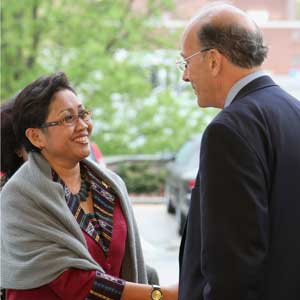Indonesian minister calls for increased collaboration

Fogarty Director Dr. Roger Glass greets Dr. Endang, the Indonesian health minister, on her first visit to NIH since her recent appointment.
Photo by Jeff Gray
Indonesia’s new minister of health says her country would like to renew its commitment to collaborate with the U.S. on biomedical research. During her first visit to NIH since her appointment, Dr. Endang R. Sedyaningsih expressed optimism about the potential for joint progress. “We’re very excited at the prospect of working with the National Institutes of Health,” she said. “Our hope is that our laboratories and researchers in Indonesia can partner with yours here in the U.S.”
Her NIH visit was timely, as President Obama is planning to visit Indonesia later this year to discuss the deepening economic relationship between the countries, in addition to shared concerns such as climate change and security. Additionally, a broad science and technology agreement between the countries was recently signed to expand research collaborations on vaccines and other pharmaceuticals as well as biological lab safety and pathogen security.
The U.S. government has been increasingly focusing on health research and technological development in the Southeast Asian nation, which is the world’s third largest democracy and home to the world’s biggest Muslim population. The U.S. Agency for International Development recently launched a five-year prevention program targeting HIV/AIDS in eight Indonesian provinces, part of a $35 million effort to reduce transmission of the disease nationally.
The visit included a meeting with Fogarty director Dr. Roger I. Glass and the leadership of several NIH Institutes and Centers. NIH currently funds several research and research training collaborations in Indonesia. Fogarty is particularly active there, supporting two separate research training programs focused on tobacco control and smoking cessation, as well as projects building research capacity in population science, HIV/AIDS and tuberculosis epidemiology and biodiversity.
source: http://www.fic.nih.gov/News/GlobalHealthMatters/Pages/0610_indonesia.aspx Leave a reply
thanks for info
Replythanks for info
Reply